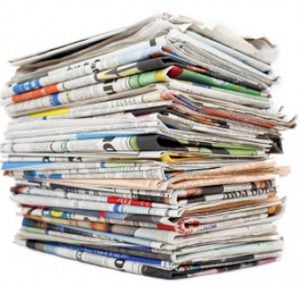 It’s been an uninspired and depressing couple of weeks for traditional media in the UAE, with both magazines and newspapers floundering in the midst of declining adspend and the rising influence of digital.
It’s been an uninspired and depressing couple of weeks for traditional media in the UAE, with both magazines and newspapers floundering in the midst of declining adspend and the rising influence of digital.
It won’t come as much of a surprise to many to hear that Emirates Business 24/7 will cease publication next month, leaving the newspaper with only what it describes as “a comprehensive and interactive electronic newspaper”. In other words, it’s ditching print in favour of the web.
The paper is also ditching its business focus, shifting instead to more generalised local news. Ahmad Abdullah Al Shaikh, managing director and director-general of DMI, the paper’s parent company, said: “The electronic copy of Emirates 24/7 will be a source of news wherever the reader is, and it will offer multiple interactive services, depending on various electronic programmes and updates, including SMS in English as well as techniques compatible with smartphone generations and famous social communication websites such as Facebook, Twitter and others.”
The demise of Emirates Business 24/7’s printed edition comes shortly after Dubai-based publishing house The Media Factory (TMF) made a significant number of staff redundant following an internal restructure. In a statement the company said the move was prompted by difficulties servicing its publishing contract with Thai Airways’ inflight magazine Sawasdee. The magazine has been affected by the recent political instability in Thailand and the barricading of the Bangkok business district, where TMF’s Thai operation is based. The problems were compounded by a lacklustre second quarter and an anticipated lean period over the summer months.
TMF, which publishes F1 Racing and Autocar and last year closed interior design title Location and suspended publication of football magazine FourFourTwo, declined to say how many people had been made redundant, but it is thought to be between 15 and 20 according to staff who have lost their jobs.
Yesterday it was also reported that ENG Media is to stop publication of its titles Media Week, Insider and IQ. The ‘temporary suspension’ of the titles has been implemented while ENG fights a legal case with Fujairah Media, the free zone through which the magazines are licensed. It is also understood that daily tabloid 7Days will move weekly during August in an attempt to avoid the annual downturn in adspend.
The fall from grace of Emirates Business 24/7’s printed edition, however, comes as no real surprise. It has had a topsy-turvy history since launching as Emirates Today in 2005, while adspend declined by five per cent in the UAE during the first quarter of 2010, with newspapers particularly badly hit. That fall was on the back of a 27 per cent drop in 2009, although adspend across the wider GCC has recovered, according to the Pan Arab Research Centre.
In all likelihood we will see further consolidation in the marketplace, simply because there are a number of significant problems attached to print media in the UAE. Firstly, there is a chronic over supply of publications targeting an extremely fragmented audience, particularly in terms of nationality and language. Secondly, with one or two exceptions, the quality of the publications is suspect. As The Economist says in ‘The strange survival of ink’, newspapers that have escaped cataclysm during the recession have done so by becoming leaner, more focused and by concentrating on providing distinctive content that consumers and advertisers are willing to pay for.
Thirdly, if a UAE publication can’t make money in print, it certainly won’t be able to make it online. Regional online adspend still hovers around the one per cent mark, despite a high number of evangelists preaching the digital gospel. Mobile and the iPad offer some hope, but the cost is currently prohibitive, relegating both to walk-on roles. UAE print media also has the unfortunate distinction of relying almost entirely on advertising, with no history of paid subscriptions – something that provides publications such as The Economist with more than 50 per cent of its revenue. Most titles are also unaudited.
Only when publications can offer distinctive, high quality content that people and advertisers are willing to pay for across multiple platforms will print media be able to prosper again in the UAE. The chances of this, however, are remote.








Iain, I wonder if your title will make the same leap? I don’t actually see the EmBiz 24/7 as being bad news as much as following global trends.
I’m not sure of the UK situation, but the two media/advertising industry rags in Oz, AdNews and B&T both have falling circulation and the excellent website/blog Mumbrella (run by one of those titles ex-editor) has traffic soaring. The content is instant and up to date (not a wek or two old) and the best thing is the comments after each article. It invokes true dialogue – exactly what static media doesn’t.
@alwaysozmatt
Who knows… the question is whether publishers can make money via the web. Emirates Business 24/7 has obviously gone online because it’s not making money in print, despite the fact that the vast majority of regional adspend is still in traditional media.
As for Mumbrella, it didn’t take ads for the first six months of its existence and had to build traffic to a certain level before companies became interested in advertising. Whether it’s making money, I don’t know. Even UK sites with huge traffic, such as The Guardian, struggle to break even. Good for the consumer, but not for the publisher. The same will apply here.
I don’t think there’s any point jumping head first into online like Emirates Biz has if the revenues aren’t there. That’s why I think the key remains multi-platform for now, until a new, workable and viable business model emerges.